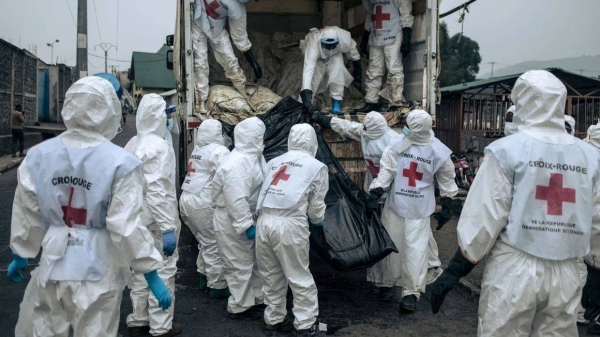- Death toll in Congo uprising nears 3,000
Over 150 female prisoners were raped and burned to death during a jailbreak last week when fleeing male inmates set fire to a prison in Goma, in the eastern Democratic Republic of Congo (DRC), a United Nations spokesperson has said.
The death toll following a brutal storming from Rwandan-backed rebels in the Congolese city of Goma has neared 3,000 after hundreds of women were raped then burned alive during a mass jailbreak.
The atrocity saw female inmates slain in their wing in the notoriously overcrowded prison after men forced their way in and went on a rampage.
But speaking during a UN press briefing on Wednesday, Vivian van de Perre, the deputy head of the UN peacekeeping force in Goma revealed a staggering 2,900 bodies have been retrieved so far amid the chaos.
UN Human Rights Office spokesperson Seif Magango told CNN that most of the 165 female prisoners who were raped by escaping male inmates died in the fire.
Between nine and 13 female inmates, “all of whom had also been raped,” survived the blaze, Magango added, citing a judicial source in the DRC.
“We did not independently verify the judicial official’s report ourselves, but we do consider his account to be credible,” Magango told CNN Thursday.
The male inmates, some of whom were killed by prison guards, plotted a mass escape on January 27 as the M23 rebel alliance battled with Congolese forces in Goma over control of the city, the UN-sponsored Radio Okapi reported Monday.
More than 4,000 detainees fled the Muzenze prison that day, it added, stating that the facility was now “completely empty” and left in ruins.
DRC communications minister Patrick Muyaya confirmed the rape of the 165 women, telling CNN Wednesday that “the government condemns with the greatest energy this barbaric crime.”
The killings and mass rape mirror recurring scenes of conflict-related sexual violence that have plagued the DRC for decades.
On Friday, the UN’s Human Rights Office said it had received reports of other cases of sexual violence involving the DRC’s army and its allied forces.
“We are verifying reports that 52 women were raped by Congolese troops in South Kivu, including alleged reports of gangrape,” said Jeremy Laurence, a spokesperson for the UN High Commissioner for Human Rights, in a statement Friday.
UN Human Rights Van de Perre said some 2,000 dead bodies had been collected from the streets of Goma in recent days, with another 900 left in hospital morgues.
Describing the carnage, she said the figure is expected to increase in the coming days.
‘There are still many decomposing bodies in certain areas so the WHO is really worried about what kind of epidemic outbreaks that can contribute to,’ Ms Van de Perre chillingly added.
During the mass jailbreak, thousands of male criminals managed to flee, but the area reserved for women was torched to the ground.
Images taken shortly after M23 fighters reached the centre of Goma showed vast plumes of black smoke rising from the jail on January 27, as long lines of men sprinted away from the inferno.
CNN has contacted the Congolese military for comment on the allegation.
This week, the M23 rebel group, which has claimed to have captured the city of Goma, called for an immediate humanitarian ceasefire after clashes with government forces left nearly 3,000 people killed.
Growing Humanitarian Crisis
As Goma residents adapt to life under M23 control, humanitarian concerns are mounting. Access to clean water has been cut off, and bodies remain in the streets, increasing the risk of disease outbreaks.
Stephan Goetghbuer, a regional lead from Médecins Sans Frontières (MSF), told the BBC, “Access to water has been cut for days, corpses have been lying in the streets, and waterborne diseases such as cholera are a real threat. Some of our cholera treatment centres are full and have been expanded.”
Meanwhile, regional peacekeeping efforts are shifting. Malawi has announced plans to withdraw its peacekeeping forces after three of its soldiers were killed. South Africa, which has lost 14 soldiers, has vowed to continue its military presence, according to BBC reports.





